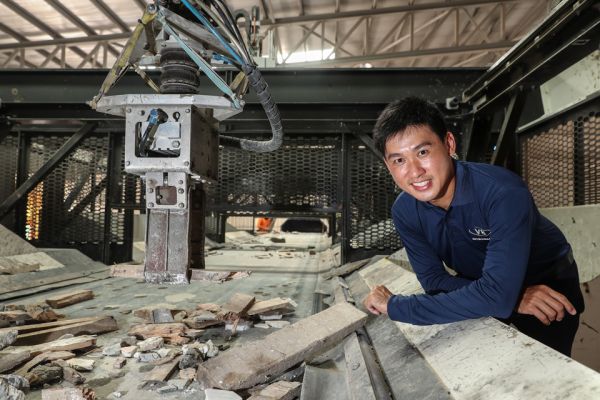V8 Environmental’s smart robots can sort through waste for recyclables 12 times faster than a human worker.
ROWS of workers stand on each side of the conveyor belt, sorting trash at a rate of 500 picks an hour. The process is slow, laborious and dirty – a task that most Singaporeans shun away from, yet cannot live without.
To solve the problem, the team at V8 Environmental flew to Finland and came back with three new helpers who did not need food, water, or toilet breaks, and could work tirelessly even without a salary.
The trio, which are really three sets of smart robotic arms, are part of the S$4.3 million material recovery facility that the company commissioned in 2018. V8 Environmental is also one of the first in Singapore to adopt artificial intelligence in waste management solutions.
The smart robots, programmed to sort through waste for recyclables such as wood and metal at a rate of 6000 picks an hour, can do the task 12 times faster than a human worker. Its capabilities also include “prioritising” items, picking out those which have a higher recycling value such as metals, over other materials of lower value.
This has increased the efficiency of Derrick Yu’s material recovery facility in Tuas. The general manager of V8 Environmental said: “Previously, we probably could sort about 400kg worth of recyclables for every tonne of waste. Now, we can sort around 600 to 700kg, which has saved us from sending more waste to Semakau.”
While the artificially intelligent machines were a great help, it also left mounting pressure on Mr Yu to reassure his employees that their jobs had not been replaced.
“We have many workers who have been with us for more than 10 years, who think that they will become redundant once we change to automation,” said Mr Yu, a second-generation leader of the family-owned business.
“Workers from the older generation are usually resistant to change and a lot of effort is required to change mindsets and persuade them to pick up new skills and attend upgrading courses.”
But he believes the effort was worth it. The plant is now able to process 350 tonnes of waste every day, while none of its staff were retrenched even during Covid-19. Instead, the automation had freed up some of its manpower – staff who were now free to take up other duties to maximise the facility’s efficiency.
Additionally, materials that are picked and sorted by the robots are less contaminated, improving recycling rates by two times up to 84 per cent in 2020.
Secrets to success
Since its founding in 1999, the family business has seen its topline grow by five times up to S$20 million in 2020.
His employees believe this is the work of a boss who is unfazed by challenges and does not mind getting his hands dirty when the need arises.
Said Eileen Yeo, business development manager, V8 Environmental: “Every worker is close to his heart, and this business is like his baby.”
“When any of our operations is short on manpower, he is willing to take over and be a replacement driver. He has all the licences, from Class 3 to Class 5,” Ms Yeo added.
To this, Mr Yu responded: “I just want to do better.”
The 38-year-old, who is next-in-line to take over the business, believes in “being on the ground to have a sense of what is happening on site”.
“When I do that, it helps me understand the market well,” said Mr Yu, who is ever ready to leave his air-conditioned office when manpower runs short.
The company also credits its newfound success to Enterprise Singapore (ESG), whose support had helped the firm with its digital transformation.
“For many of the smaller companies, I think they do not have the appetite to go and invest in such a facility,” said Ms Yeo, adding that the idea of having automatic pickers was made known to them by an ESG representative. “ESG has been very supportive along the way.. And we are very glad to have their support,” said Ms Yeo.
Pushing for greener efforts
Aside from digitalising its waste sorting business, Mr Yu also has plans to expand on its green efforts – by converting waste to energy. The company is currently exploring the possibility of converting wood chips into energy by combustion. The wood chips retrieved from his facility are sent to a separate processing site where it is burnt in a boiler, generating steam which can be converted into electricity.
At present, Mr Yu’s facility in Tuas is already a hundred per cent powered by solar energy, with excess contributed back to the national grid.
“I try my best to save the environment,” Mr Yu said.
“Yes, we are here to do business, but on the other hand we want to try our best to reduce the amount of waste going to the landfill because we have limited space in the landfill.”
